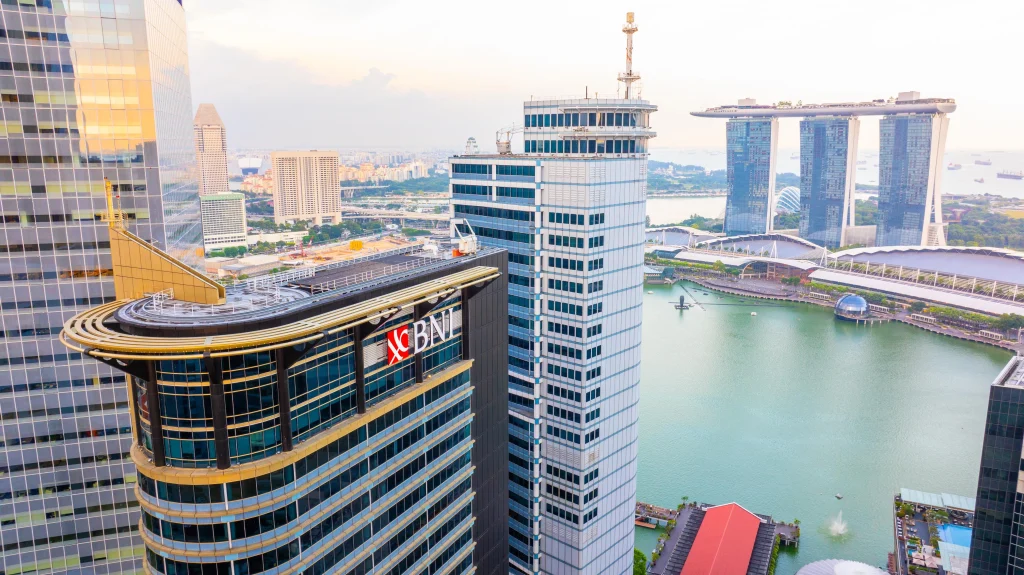[JAKARTA] Bank Negara Indonesia (BNI) and Bank Mandiri, Indonesia’s state-owned banks, are pulling out all the stops to make their mark in Singapore’s competitive wealth management sector.
This comes as an increasing number of affluent Indonesian individuals and corporate clients funnel their assets into the city-state, tapping into a market estimated to be worth around 700 trillion rupiah (S$54.7 billion).
The move is part of a bigger picture to strengthen the bank’s ties with Indonesia’s expanding base of high-net-worth individuals (HNWIs) and ultra-high-net-worth individuals (UHNWIs), many of whom are spreading their financial wings and managing significant assets beyond Indonesia.
“Our international business strategy is straightforward: we follow the flow of Indonesian wealth and aim to support our clients as they expand globally,” he noted. “So, expanding our services to Singapore is a natural progression in our efforts to better serve our clients.”
A NEWSLETTER FOR YOU

Friday, 8.30 am
Asean Business
Business insights centering on South-east Asia’s fast-growing economies.
In March, BNI launched its first wealth management service in Singapore, targeting HNWI clients, including Indonesians living in the city-state.
The bank has formed partnerships with Schroders and Fullerton Asset Management to cater to accredited investors—those with an annual income above S$300,000 or assets exceeding S$2 million in Singapore.
The bank plans to expand its partnerships with other major financial institutions in the Republic in the near future, aiming to establish a solid wealth management foundation within five years.
Steven Suryana, BNI’s senior executive vice-president of wealth management, said as an initial step, BNI will focus on serving Indonesian clients and the Indonesian diaspora, while remaining open to expanding its customer base both regionally and globally.
“We are definitely aiming for significant growth. In Indonesia, it took us around eight years to build our wealth management platform. In Singapore, we expect to achieve this much faster. Our wealth management business in Singapore focuses on HNWIs, not retail customers,” he explained.
He noted that there are significant opportunities among Indonesian assets parked in Singapore, referring to data from Indonesia’s tax amnesty programme during former president Joko Widodo’s administration.
According to Finance Ministry data, Indonesians declared around 700 trillion rupiah worth of assets held in Singapore during the tax amnesty, but only about 12 per cent of those assets were eventually repatriated to Indonesia. “There is still a substantial amount of wealth abroad, and we see a real opportunity to serve these clients through our Singapore office,” pointed out Suryana.
BNI currently holds some US$6 billion in overseas assets, with roughly half of that amount based in Singapore. Domestically, the bank manages around 200 trillion rupiah assets under management, encompassing both deposits and investments, and serves over 100,000 affluent clients.
Sustained growth
Indonesia is swiftly emerging as a powerhouse in wealth creation, with HNWIs and UHNWIs growing at a rate of 4.2 per cent in 2023, placing the country among the top four in the Asia-Pacific region. This surge was fueled by Indonesia’s strong economic expansion and growing sectoral diversification, according to a survey by Knight Frank.
The number of UHNWIs is projected to continue its sharp rise throughout the decade, solidifying Indonesia’s role as a pivotal player in Asia’s wealth landscape.
Other than BNI, Bank Mandiri, which entered the wealth management sector in Singapore in 2019, has also seen strong growth in this area.
Tri Nugroho, general manager and country head of Bank Mandiri Singapore, shared that since its launch, Mandiri Singapore wealth management portfolio has had a compound annual growth rate of 43.55 per cent.
“Looking ahead, we are expanding our reach to regional investors seeking asset diversification alternatives, including non-individual investors such as family offices and variable capital companies,” he told BT.
The bank has teamed up with Swiss firm Lombard Odier to develop its private banking division, offering personalised investment solutions and comprehensive family services, he said.
Currently, the bank serves around 50 key clients in Singapore, the majority of whom are accredited investors. There are 63 employees working in the Singapore branch.
Nugroho added that wholesale banking remains a core pillar for Mandiri’s operations in Singapore, contributing significantly to both revenue generation and long-term strategic value. This segment continues to dominate the bank’s overseas portfolio.
Asset protection
The expansion of Indonesian banks into Singapore’s wealth management sector comes amid heightened market volatility driven by trade tensions, prompting clients to seek safe-haven investments to protect their assets from instability. This presents a challenge for both banks as they work to guide clients through these turbulent times.
BNI’s Agung said that fixed-income assets continue to be a popular choice among the bank’s clients, alongside commodities, particularly safe-haven assets like gold.
Overall, their investment strategies mirror those of HNWIs globally, with a strong focus on stability and wealth preservation in a volatile market, he added. “In a market like this, most people are looking for more stability.”
Nugroho from Bank Mandiri noted the growing interest among HNWIs from Indonesia and across South-east Asia in fixed-income instruments, particularly Indonesian sovereign and corporate bonds.
“Additionally, we are seeing rising demand for structured products and fund-based solutions that offer capital protection and diversification, aligning with our clients’ pursuit of both stability and growth amid uncertain times,” he noted.


